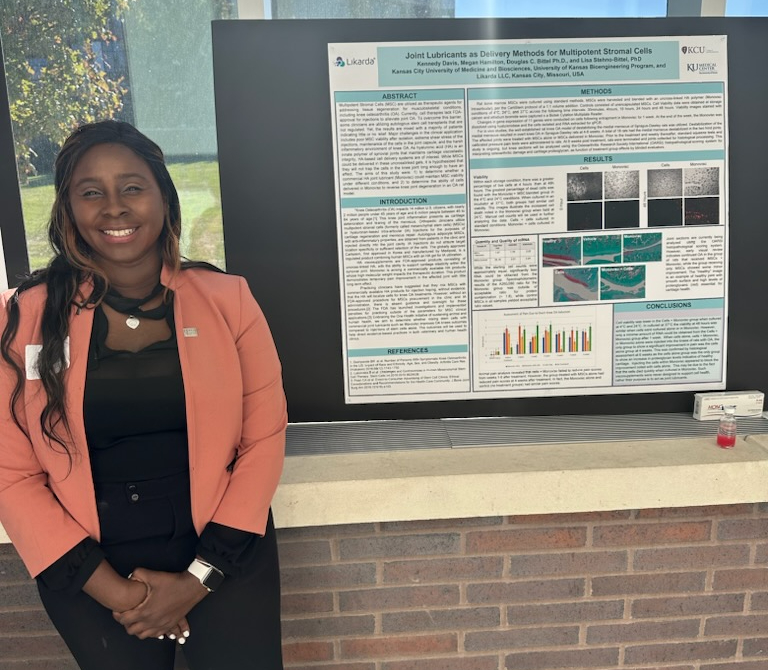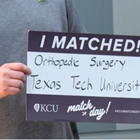Kennedy Davis, KCU College of Biosciences second-year student and research associate with Likarda®, claimed the Graduate Student Presentation Award at the regional BioNexus One Health Symposium that took place at The University of Kansas Edwards Campus.
Partnering with Likarda, Davis researched cell delivery systems to improve knee osteoarthritis, sometimes referred to as degenerative joint disease. To treat the condition, many orthopedic surgeons use a procedure that involves taking stem cells from another part of the patient’s body and injecting them into the knee joint. While this method can decrease the chance of an adverse immune response from the body, the procedure has mixed results. In some cases, stem cells transferred in this manner will migrate to other parts of the body once the patient is mobile. When this happens, the stem cells aren’t able to regenerate parts of the knee affected by osteoarthritis. Additionally, the U.S. Food and Drug Administration (FDA) has not approved a formulation for this procedure that would regulate the method of extracting and transferring stem cells.
Davis’ study analyzed the viability of stem cells in three conditions: naked in a petri dish, encapsulated in microbeads and mixed in viscous paste. Through her research, she hoped to determine the viability of stem cells if an FDA-approved, industry-grade viscous paste product, such as Monovisc® was used to encapsulate the cells before transfer. The product is a single-injection supplement that clinicians administer for long-lasting relief of pain associated with osteoarthritis. To date, her data suggests that when mixed with stem cells, the product does not promote the life of cells or restore physical surfaces of the knee joint or decrease knee joint pain over time.
“Through my research at Likarda, I have learned about intra-articular injections utilized by orthopedic clinicians to address osteoarthritis as well as the challenges and promises of stem cell therapies for osteoarthritis. Additionally, I have developed a thorough understanding of quality assurance and supply chain regulatory measures that are critical in drug discoveries to address musculoskeletal health conditions. Aligning with my professional goals as an aspiring physician scientist, I aim to implement biotechnological, therapeutic management programs to address health disparities associated with musculoskeletal disease in the clinical practice,” said Davis.
Along with the research team at Likarda, Davis is currently researching practices taking place in a variety of orthopedic fields. By working with clinicians and other biotech companies that use microplastics, they will be able to give them direct feedback based on research data.
Davis hopes to remain at KCU and matriculate to the College of Osteopathic Medicine next year. Undoubtedly, the knowledge and experience she has gained in her research endeavors position her for future success wherever her journey takes her.


_20240916183052_0.png?w=140&h=140)

(0) Comments